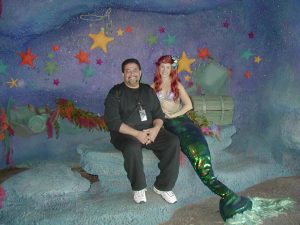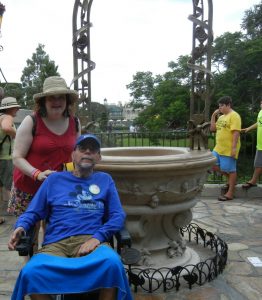On ALS and What The Little Mermaid Learned About Losing Voice and Herself
“The Little Mermaid” © Walt Disney Pictures 1989
May is ALS Awareness month and despite the popularity of the Ice Bucket Challenge, it still is not a well-known or understood disease. It’s a melancholy month for me because I see so many posts about ALS that remind me of the tragedy and cruelty of this disease and how far we have to go to manage and ultimately, to cure and eliminate it. I am always happy to see the strides that have been made and proud to be part of a community of people with ALS and their caregivers, who offer boundless support, commiseration and encouragement. While I tend to reflect on how I felt as a caregiver and in grief, this month brings me back to the actual, day-to-day impact of ALS and how Ben expressed his experiences.
ALS/Lou Gehrig’s disease, is defined as a disease which causes the death of neurons that control voluntary muscles. My friends and family became aware of the physical effects of the disease primarily through Ben’s experience. Ben’s first symptoms were a lack of balance and falling. His legs also became tired very quickly. As the disease progressed, he lost the ability to use his legs at all, and then his arms and hands, then chewing and swallowing became difficult, and his speech became increasingly impaired as he experienced those muscle losses. His cognitive skills were not affected, so he was completely aware of what was happening to his body. The progression of ALS varies from person to person, so, for example, some people may never lose their ability to walk, others lose their ability to speak first, while Ben lost it last. Eventually, the ability to breathe is lost, and that is often the cause of death from the disease.
This scene from Disney’s The Little Mermaid was poignant to me within the context of ALS. Ariel wanted so much to be a human and to be with Prince Eric that she was willing to relinquish her voice to the sea witch, Ursula. Ariel knew that her voice was integral to who she was, but she was in love, and you know how that goes, especially in a Disney film. Once she gives her voice to Ursula, she quickly realizes that she has lost the ability to express herself, and her ability to sing, which was so important to her. She also did not realize that without her voice, she was no longer recognizable to Prince Eric. Of course, she made a choice. Someone with ALS does not get a choice, and I would venture to guess that they would advise her to keep her precious voice.

The Magic Kingdom at Walt Disney World- 2001. Pre-ALS days
The loss of easy communication was very frustrating to Ben. First, phone use became difficult because handling the phone was hard and it was difficult to understand him. We then began frequent texting. Ben used a virtual/on-screen keyboard and an app that connected his phone to the computer screen. However, if his hand slid off the mouse, communication was cut off and that led to some very tense moments.
Living with Ben, I was more likely to understand what he said and I could facilitate conversations with others. There were times, however, that I could not understand him. He would shake his head and tell me to “forget it,” which upset both of us. When communication was an obstacle and he was homebound, Ben did notice and lament that he had less contact with people. Friends and relatives with whom he thought he was close stopped reaching out, or, they made promises to visit that they did not keep. At the same time, he did not really want people to see him as he looked. He did not want them to see him looking gaunt and struggling to talk, eat and move. It did leave him feeling isolated and hurt.
When strangers did not understand Ben, they sometimes assumed that he was mentally challenged and spoke to him like a child or addressed only me. Often, Ben laughed about it, but on some occasions he felt invisible and very misunderstood. So, I involved Ben in the discussions to show people that Ben was fully capable of understanding and had lots of opinions and many people did follow my lead. As caregivers and loved ones, I see it as our responsibility to educate people through example, because some people are willing but not quite sure how to engage with people with a variety of disabilities. Unfortunately, not being able to say what he wanted and be truly seen and heard sometimes caused Ben to withdraw. I cannot begin to imagine how Ben felt to be seen for the ALS symptoms rather than for himself.
[bctt tweet=”I cannot begin to imagine how Ben felt to be seen for the ALS symptoms rather than for himself.”]
After a respiratory crisis landed Ben in the hospital, he had a Bipap mask before he had the tracheostomy. This was the first time that Ben really had absolutely no voice. He could not call me, or call for help, or just have a conversation. On an emotional note, he could not kiss me or tell me he loved me. When I recently re-watched The Little Mermaid and I saw Ariel panic the first time she tried to speak and remembered that she could no longer do so, I remembered Ben’s panic at the thought that he could not easily get someone’s attention with is voice, but he also could not use a hospital call button. Ben was afraid to be alone in the hospital room and I was afraid when he was alone. The mask obscured his mouth, so reading his lips was also very difficult. We spelled out words by my reciting the alphabet and his nodding when I reached the correct letter. However, the length and tediousness of that process frustrated him, and he began to weigh what he really needed to say. There were many incidents when hospital staff ignored Ben and asked me questions that he could answer. I immediately addressed those questions to him so that he could participate in the discussion. Yes, it took longer, and it was not easy, but he mattered, and staff had to accept that. Most really were wonderful, and they got a glimpse of who Ben really was beneath the ALS. But, just as Ariel felt devastated that Prince Eric did not recognize her, Ben, too, felt that he was becoming unrecognizable, even to himself. It also made him look at how he saw himself moving forward, which was something he had tried to avoid since his diagnosis nearly six years earlier.
Ursula tells Ariel that even without her voice, she has her looks, and to “never underestimate the importance of body language.” Unfortunately, with ALS, Ben could not rely on body language. He certainly did not underestimate its importance. ALS slowly strips away a person’s ability to move their limbs and even make facial expressions. Although Ben’s experience with ALS never progressed to the point where he was completely immobilized, some people are left only with the ability to blink, if that. Without a voice or facial and body expressions, a person would understandably feel isolated and even irrelevant. Although visits from loved ones are appreciated, they are not easy, so, unfortunately, as in Ben’s case, visits become less frequent.

Walt Disney World, 2001
Ben could certainly have related to Ariel’s wish to have legs like a human. As he lost his ability to walk, he often told me that in his dreams he always saw himself walking and running. As Ben lost his abilities to walk and move his arms and hands, he saw himself as weak and self-conscious. He missed going outside and playing handball. He did enjoy using his scooter, but daily life skills were becoming impossible and that carries an emotional toll. He walked until he accepted that his legs could not handle a single step without his sinking to the ground. That took away his freedom to move around the apartment. It chipped away at his dignity to have to be transferred to and from the bed, his chair and the commode, and to have to be fed his meals. He often denied that he needed as much assistance as he did, which was stressful for me as his caregiver, but that was what he needed to tell himself to deny that ALS was progressing.
Ben was also aggravated that he could no longer do things that he loved to do, like play music on his keyboard and fix computers. He could still talk me through what needed to be done with the computer hardware, but it was not the same. He also continued to research and discover adaptive electronic and computer devices, though they rarely worked for long, as new symptoms of ALS constantly appeared that rendered them ineffective. Music always remained an essential part of Ben’s life and our relationship, and although he couldn’t play his instruments, and we could no longer dance, he never stopped listening to music and making little videos with music clips for me to celebrate different occasions. I also brought his iPad to the hospital, so he could always listen to his favorite tunes.
Body language encompasses body image. ALS seriously impacted on Ben’s body image. He said that he did not like to look at himself in mirrors. As eating became more challenging, Ben lost a lot of weight. His feet got terribly swollen and even the widest shoes did not fit, so he wore adjustable slippers. He could no longer shave himself and although he said I did a pretty good job, I did not do as perfect a job as he did. We could make it fun and funny, but the underlying issue- the deterioration of his muscles- was frightening and tragic. At one point, his aide shaved his beard and left only his mustache. He was a bit insulted that it took me a while to notice exactly what was different. I think that I somewhat tuned out the physical because there were simply so many changes, and they were too sad to dwell upon. Ben, on the other hand, regularly studied the photos from our visits to Walt Disney World and compared his physical changes from visit to visit. In fact, when I showed pictures of those visits to friends, they always commented on how thin Ben had become, shocked by his physical transformation. When I looked at the photos, I saw only the joy on his face. I guess that’s the Pollyanna in me.
Fortunately for Ariel, she was surrounded by people (well, mer-people and some very adorable sea friends) who loved and looked out for her. Sebastian was an astute and compassionate, if high-strung, caregiver. Nutty but devoted Scuttle revealed Ursula’s evil magical trick to get Eric and Ariel’s voice was restored, she was able to keep her legs and marry the Prince. There was the Disney happy ending.
ALS is not a fictional magical trick with a happy ending, rather, it is a cruel disease to which Ben ultimately succumbed. Still, despite the obvious devastation of his struggle and of losing him, I have to look at the end of Ben’s ALS story with some positive thoughts. Ben’s personality shone as he left this world, according to the very wishes that he expressed, even without his voice, embraced by people he loved and requested to be present, and with music that filled his heart. He was heard and he knew that he mattered and was loved, as his hero Buzz Lightyear said, “to infinity and beyond.”
Now, I use my voice to spread awareness and support caregivers and people with ALS. And, in my Disney way, I will keep wishing on stars for a cure that will ensure a genuinely happy ending for those with ALS.
[bctt tweet=”In my Disney way, I will keep wishing on stars for a cure that will ensure a genuinely happy ending for those with ALS.”]

Walt Disney World
July 2014
November 6, 2019 @ 8:17 am
Thank you; you captured the tragedy and poignancy of this awful disease.
November 6, 2019 @ 5:31 pm
Thank you very much for reading the post and for your kind words. It touches my heart that it resonated with you.